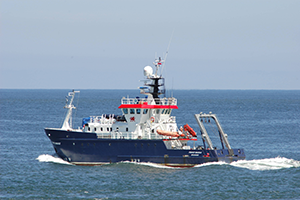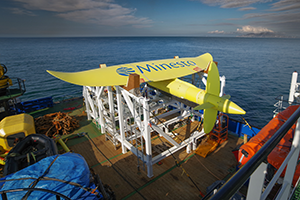Funding boost for research to support the development of marine renewable energy in Wales
 Bangor University’s research vessel the RV Prince Madog at sea undertaking marine renewables research for the SEACAMS2 projectAn industrial sector identified as vital to growing a sustainable economy in Wales is to be given a further boost with the awarding of an additional £1.5M of EU funding from the Welsh Government. This will extend research and innovation to support the development of marine renewable energy in Welsh waters. The extension to the SEACAMS2 partnership between Bangor University and Swansea University will enable research to continue until 2022. The work will contribute to the Low carbon, Energy and Environment sector.
Bangor University’s research vessel the RV Prince Madog at sea undertaking marine renewables research for the SEACAMS2 projectAn industrial sector identified as vital to growing a sustainable economy in Wales is to be given a further boost with the awarding of an additional £1.5M of EU funding from the Welsh Government. This will extend research and innovation to support the development of marine renewable energy in Welsh waters. The extension to the SEACAMS2 partnership between Bangor University and Swansea University will enable research to continue until 2022. The work will contribute to the Low carbon, Energy and Environment sector.
Counsel General and Minister for European Transition, Jeremy Miles, said, “Generating energy from renewable sources is not only vital in creating a low-carbon economy and contributing to the global challenge of climate change, it also provides Wales with a real opportunity to be at the forefront of a major emerging industry.
“This investment further highlights the importance of securing replacement funding from the UK Government to support growth and jobs in Wales following our exit from the EU.”
SEACAMS2 director, Professor Lewis Le Vay at Bangor University, said:
“Wales is well-placed to be a world leader in the development of low-carbon energy generation from its coastal and offshore waters. This new funding is an exciting opportunity to maximise the benefits of SEACAMS2, which since 2015 has been helping to unlock the potential of marine renewable energy through collaborative research partnerships with the Welsh renewables industry. We are now working to deliver a range of additional collaborative research and innovation projects that can help support growth in the marine economy during this critical period for economic recovery. ”
Professor Kam Tang, Principal Investigator for SEACAMS2 at Swansea University added:
“This allows us to continue our partnership working to support the marine renewable and goods and services sectors across Wales. The funding will enable us to deliver projects including product development support, tidal energy modelling and collecting the environmental evidence scientific data for innovation and de-risking.”
 Minesto Deep Green kite being deployed off Holyhead Credit: Minesto
Minesto Deep Green kite being deployed off Holyhead Credit: Minesto
Jess Hooper, Marine Energy Programme Manager at Marine Energy Wales commented:
“We welcome the extension to SEACAMS2 – the collaboration that this facilitates between industry and academia is key to bridging the gap between innovation and research and aiding marine renewable companies in answering some of the unknowns in the sector. We look forward to MEW’s continued involvement facilitating the alignment of academic research with industry needs, thereby enabling the expedited growth of the sector and the blue economy’s contribution to the green recovery.”
http://www.seacams.ac.uk/seacams2/
Publication date: 10 September 2020
